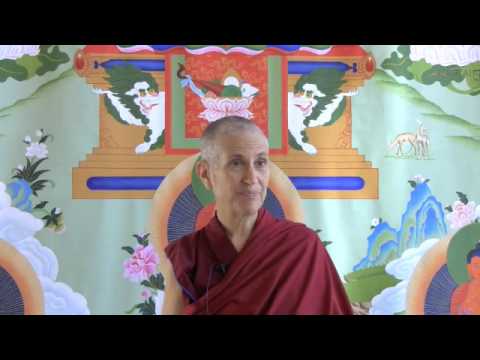Four opponent powers: Determination to refrain
Part of a series of Bodhisattva's Breakfast Corner talks on the Stages of the Path (or lamrim) as described in the Guru Puja text by Panchen Lama I Lobsang Chokyi Gyaltsen.
- The importance of a determination not to repeat a negative action
- Putting a time commitment on our determination for a very habitual destructive action
We were talking about the four opponent powers. The first one was regret, then restoring the relationship, and then the third one is to make a strong determination not to do the action again. This one is really really important because without it then, because of our habitual energy, there’s the likelihood that we will keep making the same mistake again and again and again. So we see that one of the karmic results of an action is the habit to keep doing it
When we make the determination not to do it again we are actively going against that habit, which is so important because we can see in our own lives how much we’re governed by habitual emotions and habitual ways of thinking: the habitual words that come out of our mouth, habitual actions. We’re very much creatures of habit. This determination to change is really an important one, and when our mind is very clear, we have a strong determination to change. Even though we may not be so confident we’ll be able to, there is a determination to do it, but when the habitual pattern comes up, if our mind is not strong, we forget all about our determination to change and in fact we don’t even recognize this as a habitual harmful pattern. We just “Well this is the way I am.” That’s why being able to be mindful and identify what’s going on in our mind and what we’re thinking and saying and doing is important, but also having that strong intention not to repeat it and recalling that as much as possible. That’s why we do the 35 Buddhas and the Vajrasattva on a daily basis, if we can, and they all contain those things that I will not do it again. You might think, “I’ve said I won’t do it again already. How come I have to say again? I mean, I said this last night when I did 35 Buddhas. How come I’ve got to say it again?” Well this is why, because we really need to familiarize ourselves again and again and again with this wish to change.
Sometimes it takes quite a bit of courage to really want to change, because we’re so familiar with the old stuff and even though it’s painful, even though it makes us miserable, even though we know it’s not good for us, because the energy just goes like water flowing down the hill. Then “Well I don’t really want to exert the energy to have to change this.” So we let it go, but then we wind up having problems later. Whereas if we really tried to make our mind strong and say “Okay I’m not going to do this,” then it makes it much easier to actually not do it.
Somebody sent us an article. I was reading it last night about how different animals and human beings, we do whatever everybody else is doing. Even they had the picture of the bonobos, (how do you say it? that kind of ape, not a baboon. It was another kind.) Anyway, when it smiles, all the other ones around him smile too, and like when we laugh, then people around us laugh, so we tend to join in whatever is going on in the group around us. That’s why when we really have a determination to change, if we live with people who have that same determination and who aren’t involved in doing what we habitually do, then it becomes much easier for us to change. Of course the urge, the impulse, still comes in the mind, doesn’t it? It just comes on really strongly. It’s like, “Oh I’ve got to act out immediately. I can’t wait a split second.” So there we really need not only the help of the group but our own internal strength and also because we’re not always with a supportive group, we need that internal strength for those times as well. That’s the third of the four opponent powers.
Venerable Thubten Chodron
Venerable Chodron emphasizes the practical application of Buddha’s teachings in our daily lives and is especially skilled at explaining them in ways easily understood and practiced by Westerners. She is well known for her warm, humorous, and lucid teachings. She was ordained as a Buddhist nun in 1977 by Kyabje Ling Rinpoche in Dharamsala, India, and in 1986 she received bhikshuni (full) ordination in Taiwan. Read her full bio.


